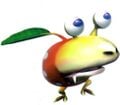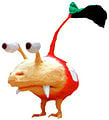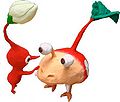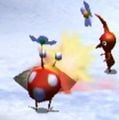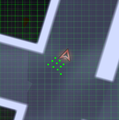Bulbmin: Difference between revisions
(mechanics being a "reference" doesnt really make sense) |
Dolphinius (talk | contribs) m (→Naming) |
||
| Line 147: | Line 147: | ||
|jpcommon = The mature Bulbmin is called {{j|ハチャッピー|Ha Chappī}}, which means "Leaf Chappy"; "leaf" is because of the leaf coming out of their backs, and Chappy is the Japanese name for Bulborb. The juvenile Bulbmin is called {{j|コッパチャッピー|Koppa Chappī}}. | |jpcommon = The mature Bulbmin is called {{j|ハチャッピー|Ha Chappī}}, which means "Leaf Chappy"; "leaf" is because of the leaf coming out of their backs, and Chappy is the Japanese name for Bulborb. The juvenile Bulbmin is called {{j|コッパチャッピー|Koppa Chappī}}. | ||
|jpname = {{j|ヤドリピクミンとその宿主|Yadori Pikumin To Sono Yadonushi|Parasitic Pikmin and its host}}. The name {{j|ヤドリピクミン|Yadori Pikumin|Parasitic Pikmin|f=tp}} is translated in {{p4}} as "Hermikmin". | |jpname = {{j|ヤドリピクミンとその宿主|Yadori Pikumin To Sono Yadonushi|Parasitic Pikmin and its host}}. The name {{j|ヤドリピクミン|Yadori Pikumin|Parasitic Pikmin|f=tp}} is translated in {{p4}} as "Hermikmin". | ||
|scientific = ''Parasiticus pikminicus''. | |scientific = ''Parasiticus pikminicus''. ''Parasiticus'' is Latin for "parasitic", given that the Bulbmin itself is a parasitic life-form, and ''pikminicus'' is derived from "Pikmin". | ||
|internal = Internally, they are known as <code>leafchappy</code>, which is the translation of their Japanese name. | |internal = Internally, they are known as <code>leafchappy</code>, which is the translation of their Japanese name. | ||
}} | }} | ||
Revision as of 08:58, August 29, 2024
|
|
| |||
|---|---|---|---|
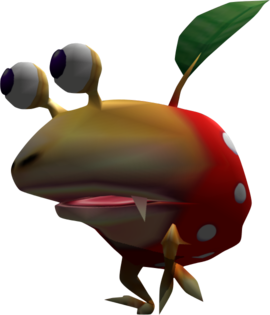
| |||
| Appears in | Pikmin 2 | ||
| Scientific name | Parasiticus pikminicus | ||
| Family | Pikmin | ||
| Areas | None | ||
| Caves | Frontier Cavern, Submerged Castle, Hole of Heroes | ||
| Challenge Mode stages | Green Hole, Hidden Garden | ||
| 2-Player Battle stages | None | ||
| Attacks | Eat Pikmin | ||
Bulbmin (adults: ハチャッピー?, lit.: "Leaf Chappy", juvenile: コッパチャッピー?, lit.: "Small Leaf Chappy") are a parasitic species of Pikmin in Pikmin 2 that infect Bulborbs, hence the name. They are only found in caves and there is no way to store them, meaning Bulbmin can only be used in the cave they are found in. They are resistant to all four hazards defined by the game, and are one of the only ways to gain Pikmin in a cave, making them a valuable asset.
Uniquely for a Pikmin type, they start out as enemies when they appear in a cave. An adult Bulbmin, closely resembling a Red Bulborb, is followed by up to 10 juvenile Bulbmin, which take on a more unique appearance (having completely black eyes rather than the blue or purple eyes of the dwarf and adult Bulborbs, uniquely proportioned and colored legs, and relatively fewer and larger white spots which are positioned differently than those of other Bulborbs) with a stem and leaf (or bud or flower) atop their back. They can be found wandering the floors of certain caves and behave much like the Spotty Bulbear, patrolling an established path. The adult Bulbmin is quite aggressive, but can be defeated quickly. When the adult Bulbmin is defeated, the juvenile Bulbmin will panic until whistled, at which point they will join the player's squad. At this point, they can be used like normal Pikmin. When the player uses a geyser to exit the cave, all Bulbmin in their squad are left behind.
As Pikmin
| |||
|---|---|---|---|
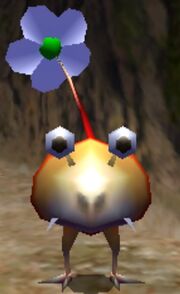
| |||
| Scientific name | Parasiticus pikminicus | ||
| Family | Pikmin (parasitic) | ||
| Resistance | Fire, electricity, water, poison, and tripping | ||
| Attack strength | Average(?) | ||
| Mobility | Average(?) | ||
| Throw | Average | ||
| Digging speed | Average(?) | ||
| Carrying capacity | 1 | ||
| Size | Body length: 15mm | ||
As Pikmin that the player's leaders can use, the Bulbmin are identical to other Pikmin types, but look like Bulborbs and sound different. They have average capabilities in terms of mobility and strength, but are immune to all elemental hazards (fire, electricity, water, poison) and non-elemental hazards, and also cannot trip. As beneficial as their abilities may seem, they cannot leave the caves with the group, for an unknown reason. Instead, they stay behind and watch the leaders and fellow Pikmin leave. Because of this, they will not count towards the overall Pikmin count, although any deaths do count towards the lost Pikmin total. Them being left behind when a cave is exited does not count as a death, however. This makes them ideal for use in Candypop Buds.
These Pikmin infect Bulborbs and take control of them, but it is implied by Olimar that they can take on other hosts as well. There is no information regarding what Bulbmin without a host actually look like. It is possible that they are green, since they appear as green dots on the radar, and since their leaves glow green when idle. Although they may also be orange, given the color of their stem, as well as the color of the conical aiming cursor when a Bulbmin is in hand, and the color of the trail they produce when thrown. That said, what is known is that their buds and flowers are white, just like Red Pikmin, Yellow Pikmin and Blue Pikmin.
The only way that Bulbmin can be killed before ever being whistled is if they are crushed or they fall over the side of a level into the abyss when shaken by an enemy attack, explosion or other sufficient force. When that happens, their deaths will not count for the player's death tally.
Up to 10 juvenile Bulbmin can spawn with an adult Bulbmin, but they count towards the one hundred Pikmin limit when they spawn, so if the squad has more than ninety Pikmin when entering the sublevel, not all of the juvenile Bulbmin will spawn.
While Bulbmin only appear in Pikmin 2, Pikmin 4 introduces Glow Pikmin which could be considered a successor to the Bulbmin. Much like Bulbmin, Glow Pikmin are a unique Pikmin type which can only be obtained through special means, are immune to all elemental hazards, and are left behind when exiting a cave.
Stats
| Weight | Max. carriers |
Seeds | Value | Health | Regen. |
|---|---|---|---|---|---|
| 7 | 14 | 10[note 1] | 300 | No |
- ^ This enemy cannot be delivered to Onions in-game. This information is obtained from the game files.
Notes
Ship's dialogs
“The confused bulborb has fallen in with the Pikmin. They appear to coexist peacefully.
Strange... this bulborb has a leaf sprouting from its spine, much like the leaf on a Pikmin's head.”Olimar's notes
Louie's notes
Pikmin 2 Nintendo Player's Guide
Strategy
Pikmin
To ensure a low Pikmin loss, if not zero, wait until it approaches the active leader, then throw Pikmin rapidly on top of the beast, further to the back than the front. If done correctly and with good aim, it should shake them off and turn around slowly: it has been distracted, leaving a large time gap in which to swarm it. Do it, then, and it should die before any of the Pikmin it manages to swallow do. Also if it is attacked by other Bulbmin it will hesitate slightly before attacking allowing more time to deal damage.
As extra precautions or for an easier fight, use Purple Pikmin or an ultra-bitter spray if it captures any Pikmin.
Leaders
Approach the Bulbmin like a roaming Bulbear, attacking it from behind and avoiding its bite. Although its health is significantly lower than a Bulbear's, it can still take a substantial amount of time to kill without the Rocket Fist.
Technical information
Enemy
| Pikmin 2 technical information (?) | |||
|---|---|---|---|
| Internal name | leafchappy
| ||
| Global properties (List) | |||
| ID | Japanese comment | Property | Value |
| s000 | friction(not used) | Friction | 0.5 |
| s001 | wallReflection | Unknown (wall bounce speed multiplier?) | 0.5 |
| s002 | faceDirAdjust | Unknown | 0.25 |
| s003 | accel | Acceleration | 0.1 |
| s004 | bounceFactor | Unknown (bounce when it hits the ground?) | 0.3 |
| fp00 | ライフ | HP | 300 |
| fp01 | マップとの当り | Unknown (related to slopes) | 20 |
| fp02 | ダメージスケールXZ | Horizontal damage scale | 0.2 |
| fp03 | ダメージスケールY | Vertical damage scale | 0.2 |
| fp04 | ダメージフレーム | Damage scale duration | 0.35 |
| fp05 | 質量 | Unknown (weight?) | 0.001 |
| fp06 | 速度 | Move speed | 50 |
| fp08 | 回転速度率 | Rotation acceleration | 0.2 |
| fp09 | テリトリー | Territory radius | 400 |
| fp10 | ホーム範囲 | "Home" radius | 50 |
| fp11 | プライベート距離 | "Private" radius | 70 |
| fp12 | 視界距離 | Sight radius | 300 |
| fp13 | 視界角度 | FOV | 90 |
| fp14 | 探索距離 | Unknown (exploration radius?) | 300 |
| fp15 | 探索角度 | Unknown (exploration angle?) | 90 |
| fp16 | 振り払い率 | Successful shake rate | 1 |
| fp17 | 振り払い力 | Shake knockback | 150 |
| fp18 | 振り払いダメージ | Shake damage | 1 |
| fp19 | 振り払い範囲 | Shake range | 25 |
| fp20 | 攻撃可能範囲 | Unknown (shock attack max range?) | 40 |
| fp21 | 攻撃可能角度 | Unknown (shock attack max angle?) | 30 |
| fp22 | 攻撃ヒット範囲 | Unknown (attack hit range?) | 50 |
| fp23 | 攻撃ヒット角度 | Unknown (attack hit angle?) | 35 |
| fp24 | 攻撃力 | Attack damage | 10 |
| fp25 | 視界高 | Unknown (height visibility?) | 50 |
| fp26 | 探索高 | Unknown (exploration height?) | 50 |
| fp27 | ライフの高さ | HP wheel height | 90 |
| fp28 | 回転最大速度 | Rotation speed | 4 |
| fp29 | 警戒時間 | Unknown (warning time?) | 15 |
| fp30 | 警戒ライフ | Unknown | 50 |
| fp31 | ライフ回復率 | Regeneration rate | 0 |
| fp32 | LOD半径 | Off-camera radius | 35 |
| fp33 | マップとのあたりポリゴンの選定 | Collision processing radius | 30 |
| fp34 | ピクミンとのあたり | Pikmin damage radius | 10 |
| fp35 | 石化時間 | Petrification duration | 1 |
| fp36 | ヒップドロップダメージ | Purple Pikmin drop damage | 50 |
| fp37 | 地震気絶確立 | Purple Pikmin stun chance | 0.3 (30%) |
| fp38 | 地震気絶時間 | Purple Pikmin stun time | 5 |
| ip01 | 振り払い打撃A | Shake mode 1 – hit count | 8 |
| ip02 | 振り払い張付1 | Shake mode 1 – Pikmin requirement | 5 |
| ip03 | 振り払い打撃B | Shake mode 2 – hit count | 15 |
| ip04 | 振り払い張付2 | Shake mode 2 – Pikmin requirement | 10 |
| ip05 | 振り払い打撃C | Shake mode 3 – hit count | 20 |
| ip06 | 振り払い張付3 | Shake mode 3 – Pikmin requirement | 20 |
| ip07 | 振り払い打撃D | Shake mode 4 – hit count | 25 |
| Specific properties | |||
| ID | Japanese comment | Property | Value |
| fp01 | 白ピクミン | White Pikmin poison damage | 500 |
Pikmin
| Pikmin 2 technical information (?) | |
|---|---|
| Attack strength | 10 |
| Running speed | 120 leaf, 140 bud, 170 flower |
| Digging speed | 1× the norm |
Other information
- Size: Body length: 50mm, as per the e-card
- Pikmin 2 Piklopedia number: #12
Naming
- See more: Grub-dog family#Naming.
- Common name: Bulbmin. It is a combination of "Bulborb" and "Pikmin".
- Japanese nickname: The mature Bulbmin is called ハチャッピー?, which means "Leaf Chappy"; "leaf" is because of the leaf coming out of their backs, and Chappy is the Japanese name for Bulborb. The juvenile Bulbmin is called コッパチャッピー?.
- Japanese name: ヤドリピクミンとその宿主?, lit.: "Parasitic Pikmin and its host". The name ヤドリピクミン? (lit.: "Parasitic Pikmin") is translated in Pikmin 4 as "Hermikmin".
- Scientific name: Parasiticus pikminicus. Parasiticus is Latin for "parasitic", given that the Bulbmin itself is a parasitic life-form, and pikminicus is derived from "Pikmin".
- Internal names: Internally, they are known as
leafchappy, which is the translation of their Japanese name. - Prerelease: None.
Names in other languages
| Language | Name | Meaning |
|---|---|---|
| ハチャッピー; コッパチャッピー? Ha Chappī; Koppa Chappī |
Leaf Chappy; Small Leaf Chappy | |
| Bulbikmin | From "Bulborb" and "Pikmin" | |
| Punktmin | Dotmin; Portmanteau of "Punktkäfer" ("Dot Beetle", the Bulborbs German name) and "Pikmin". | |
| Colmin | Portmanteau of "Coleto" (Bulborb in the Italian translations) and "Pikmin" | |
| Bulbikmin | Portmanteau of "Bulbo" (Bulborb in the Spanish translations) and "Pikmin" |
Gallery
A Red Pikmin trying to carry an adult Bulbmin's corpse. The creature's size can be compared to the Bulborb with this image.
Bulbmin in the Piklopedia.
Juvenile Bulbmin in a panic.
A Red Pikmin and a juvenile Bulbmin destroying a fire geyser.
How the carrying behavior of Bulbmin works in the field with the use of cheating devices.
The Piklopedia icon of the Bulbmin in the Nintendo Switch version of Pikmin 2.
The Bulbmin's e-card, #12 (13th red card).
Trivia
- In an official Japanese poll, Bulbmin and their juveniles were ranked as the most popular Bulborb enemy in Pikmin 2, even above the Dwarf Red Bulborb and Red Bulborb.

- The only place where Bulbmin can be buried – and hence, the only place where one can observe Bulbmin with buds – is the Frontier Cavern, on its fourth and fifth sublevels. Swooping Snitchbugs can plant them in the ground on the former and they can be planted by Mamutas on the latter.
- If the game is altered such that it allows Bulbmin on the surface, they will take refuge in the ship's storage when the day ends, just like Purple Pikmin and White Pikmin. They will still count towards Olimar's Pikmin count, but they cannot be taken out of the ship the next morning. Like the other ship-dwelling types, they will take fallen foes or pellets to a random Onion and will tote any other objects, like berries, to their correct location. They will still be immune to all hazards.
- Although all Bulbmin are immune to poison gas, the adult Bulbmin will take a fair amount of damage upon eating a White Pikmin.
- Bulbmin can actually be found in the game files of Pikmin 3, despite them being absent in-game. Because of their model being identical to the one in Pikmin 2, it can be assumed that the idea of them returning was scrapped early in development.
- It seems that the only Bulborb that the Bulbmin tends to take hostage is the Red Bulborb, even when it would make more sense to take control of a Hairy Bulborb in cold caves. This is generally in line with real-life biology, where a parasite will be specialized to take only one specific species as a host.
- Bulbmin are the only Pikmin that were created before Super Smash Bros. Brawl and do not appear in that game in any way, or in any other subsequent Smash title.
- A Bulbmin appears on the New Play Control! Pikmin 2 Channel Screen.
- Strangely enough, the young Bulbmin do not die when caught in an explosion while under the control of the mature Bulbmin. However, when under the player's control, they can die by explosions. This is more of a useful tip, since the mature Bulbmin can die from it, and the young will remain fine.
- When juvenile Bulbmin perish, their souls appear as any other enemies' souls, not as Pikmin souls. This may likely be due to how the Bulbmin find a bulborb host, in which the host ends up losing its life as well.
- Bulbmin are the first type to have a unique voice, and are the only type with unique voice samples in Pikmin 2
- They, along with Breadbugs, can be cannibalistic, as the adult Bulbmin will eat juvenile Bulbmin following a leader.
- The Pikmin appear to be orange, as hinted by the picture above, and by the orange coloration seen at the tip where the stem meets the leaf/bud/flower. If this is the case, they would be the only Pikmin type to have a separate idle glow/map icon color than their main coloration.
- That being said, the orange coloration of the stem could be explained to be a translation of the orange gradient that separates the yellow front and the red back of the Bulbmin, or simply an arbitrary aesthetic choice to distinguish their stems from Red Pikmin.
- Besides the size, adult Bulbmin and juvenile Bulbmin can be distinguished by the number of spots on their backs.
- According to the Japanese version of Olimar's notes on the Bulbmin, the Pikmin attaches its limbs to the host's ganglia and secretes endocrine disruptors. Additionally, it is mentioned that a recent theory suggests that it might be symbiotic rather than parasitic.
- Although Bulbmin are not present in Pikmin 4, they are mentioned by Olimar to be Ambuloradicis akin to the Startle Spore.
See also
| Pikmin | |
|---|---|
| Types | Red Pikmin • Yellow Pikmin • Blue Pikmin • Purple Pikmin • White Pikmin Rock Pikmin • Winged Pikmin • Ice Pikmin • Bulbmin • Glow Pikmin |
| Biology | Candypop Bud • Idle • Maturity • Onion • Flarlic • Pellet Pikmin extinction • Trip • Sprout • Seedling • Soul • Squad |
| Abilities | Carry • Dig • Dodge • Fight • Hide |
| Controls | Charge • Dismiss • Swarm • Pluck • Throw • Whistle |
| Other | Decor Pikmin • Leafling • Mushroom Pikmin • Pikpik carrot |
